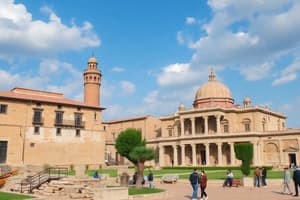Podcast
Questions and Answers
What does the term 'history' originate from?
What does the term 'history' originate from?
- An Egyptian hieroglyph meaning 'time'
- A Latin phrase meaning 'past events'
- A Greek word meaning 'inquiry' (correct)
- A Roman term meaning 'story'
Which of the following defines the study of how history is written?
Which of the following defines the study of how history is written?
- Archaeology
- Genealogy
- Paleontology
- Historiography (correct)
What are original materials from the time period being studied considered?
What are original materials from the time period being studied considered?
- Tertiary sources
- Secondary sources
- Reference sources
- Primary sources (correct)
Which historical period followed the fall of the Roman Empire?
Which historical period followed the fall of the Roman Empire?
What does historical research involve?
What does historical research involve?
Which key concept in history examines the causes and effects of events?
Which key concept in history examines the causes and effects of events?
Which revolution marked the transition from hunting and gathering to agriculture?
Which revolution marked the transition from hunting and gathering to agriculture?
Which school of historical thought emphasizes objectivity and empirical evidence?
Which school of historical thought emphasizes objectivity and empirical evidence?
What is one of the benefits of studying history?
What is one of the benefits of studying history?
What is the focus of political history?
What is the focus of political history?
Flashcards
Historiography
Historiography
The study of how history is written, including the methods and interpretations used by historians and the biases that shape historical accounts.
Primary Sources
Primary Sources
Original materials from the time period being studied, such as documents, artifacts, and eyewitness accounts.
Secondary Sources
Secondary Sources
Interpretations of primary sources, such as books, articles, and documentaries.
Prehistory
Prehistory
Signup and view all the flashcards
The Middle Ages
The Middle Ages
Signup and view all the flashcards
Causation
Causation
Signup and view all the flashcards
Change and Continuity
Change and Continuity
Signup and view all the flashcards
Evidence
Evidence
Signup and view all the flashcards
The Neolithic Revolution
The Neolithic Revolution
Signup and view all the flashcards
Positivism
Positivism
Signup and view all the flashcards
Study Notes
There are no new updates that can be made to the text provided, keeping the existing study notes.
- History is the study of the past.
- Encompasses all aspects of human society.
- Includes political, economic, social, cultural, scientific, technological, and medical developments.
- Comes from the Greek word "historia," meaning "inquiry" or "narrative."
- Differs from prehistory which refers to the period before written records.
Historiography
- The study of how history is written.
- Includes examining the methods and interpretations used by historians.
- Considers the biases and perspectives that shape historical accounts.
- Historians use primary and secondary sources.
- Primary sources are original materials from the time period being studied, such as documents, artifacts, and eyewitness accounts.
- Secondary sources are interpretations of primary sources, like books, articles, and documentaries.
Historical Periods
- Periods help historians organize and understand the past.
- Common periods include: Prehistory, Ancient History, Middle Ages, Renaissance, Early Modern Period, Modern Era, and Contemporary History.
- Prehistory: spans from the appearance of humans to the invention of writing.
- Ancient History: includes the rise and fall of early civilizations.
- The Middle Ages: covers the period between the fall of the Roman Empire and the Renaissance.
- The Renaissance: marks a renewed interest in classical art and learning.
- The Early Modern Period: characterized by exploration, the Reformation, and the rise of nation-states.
- The Modern Era: includes the Industrial Revolution and the World Wars.
- Contemporary History: refers to the period from the mid-20th century to the present.
Methods of Historical Research
- Involves several steps.
- Historians formulate a research question.
- They gather and evaluate sources.
- They interpret the evidence.
- They construct a narrative or argument.
- Historians use critical thinking skills to analyze sources.
- Consider the context in which sources were created.
- Look for corroboration of evidence from multiple sources.
- Acknowledge the limitations of their sources and interpretations.
Key Concepts in History
- Causation: examines the causes and effects of historical events.
- Change and Continuity: identifies patterns of change and stability over time.
- Significance: assesses the importance of historical events and figures.
- Perspective: considers the viewpoints of different people in the past.
- Evidence: uses primary and secondary sources to support historical claims.
- Interpretation: acknowledges that history is subject to different interpretations.
Major Historical Events
- The Neolithic Revolution: transition from hunting and gathering to agriculture.
- The rise of ancient civilizations in Mesopotamia, Egypt, and the Indus Valley.
- The development of democracy in ancient Greece.
- The Roman Empire's expansion and eventual decline.
- The spread of major religions: Christianity, Islam, and Buddhism.
- The Renaissance and its impact on art, science, and culture.
- The Age of Exploration and its consequences for global trade and colonization.
- The Scientific Revolution and the Enlightenment.
- The French Revolution and the rise of Napoleon.
- The Industrial Revolution and its social and economic effects.
- World War I and World War II and their devastating consequences.
- The Cold War and the rise of nuclear weapons.
- Decolonization and the emergence of new nations.
- Globalization and its impact on the world economy and culture.
Schools of Historical Thought
- Different schools of thought influence historical approaches.
- Examples:
- Positivism: emphasizes objectivity and empirical evidence.
- Marxism: focuses on class struggle and economic factors.
- Social history: examines the experiences of ordinary people.
- Cultural history: explores the role of culture and ideas.
- Poststructuralism: questions traditional historical narratives and power structures.
Importance of Studying History
- Provides insights into the present.
- Helps us understand how societies have evolved over time.
- Promotes critical thinking and analytical skills.
- Provides a sense of identity and belonging.
- Teaches about different cultures and perspectives.
- Fosters empathy and understanding.
- Helps avoid repeating past mistakes.
- Equips us to address current challenges and shape the future.
Challenges in Studying History
- Bias in sources: sources may reflect the biases of their creators.
- Incomplete evidence: The historical record is often incomplete and fragmented.
- Conflicting interpretations: Historians may disagree on the interpretation of events.
- Presentism: tendency to judge the past by present-day values.
- Eurocentrism: focus on European history at the expense of other regions.
Subfields of History
- Political History: Focuses on the study of power, government, and political institutions.
- Social History: Examines the everyday lives, experiences, and social structures of ordinary people.
- Economic History: Studies the development of economies, trade, and financial systems.
- Cultural History: Explores the cultural values, beliefs, and practices of societies.
- Military History: Analyzes wars, battles, and military strategies.
- Intellectual History: Investigates the history of ideas and philosophical thought.
- Environmental History: Examines the relationship between humans and the environment.
- Diplomatic History: Focuses on the study of international relations and diplomacy.
- Gender History: Explores the roles, experiences, and status of women and men in the past.
History and Other Disciplines
- Interconnected with other disciplines.
- Archaeology: provides physical evidence of past societies.
- Anthropology: studies human cultures and societies.
- Sociology: examines social structures and human behavior.
- Political science: studies government and political systems.
- Economics: analyzes economic systems and behavior.
- Geography: studies the physical and human characteristics of the Earth.
- Literature: provides insights into the values and beliefs of past societies.
- Art History: examines the development of art and visual culture.
Digital History
- Uses digital tools and technologies to research, preserve, and present historical information.
- Involves creating digital archives, online exhibits, and interactive maps
- Facilitates collaboration among historians.
- Enables new forms of historical analysis and interpretation.
Oral History
- Involves collecting and preserving spoken memories of past events.
- Provides valuable insights from individuals whose voices might otherwise be excluded.
- Can supplement written sources and offer different perspectives.
- Requires careful interviewing techniques and ethical considerations.
Studying That Suits You
Use AI to generate personalized quizzes and flashcards to suit your learning preferences.




